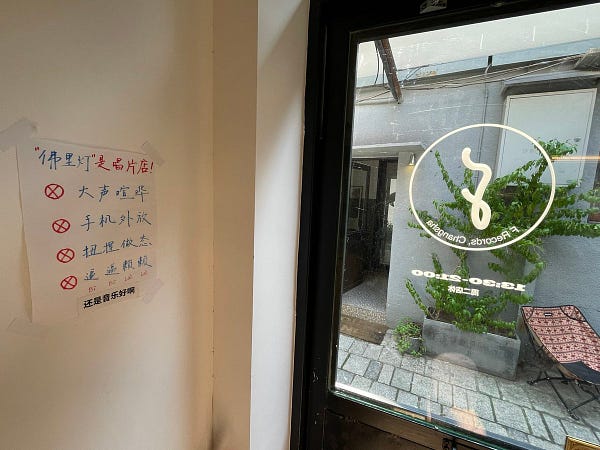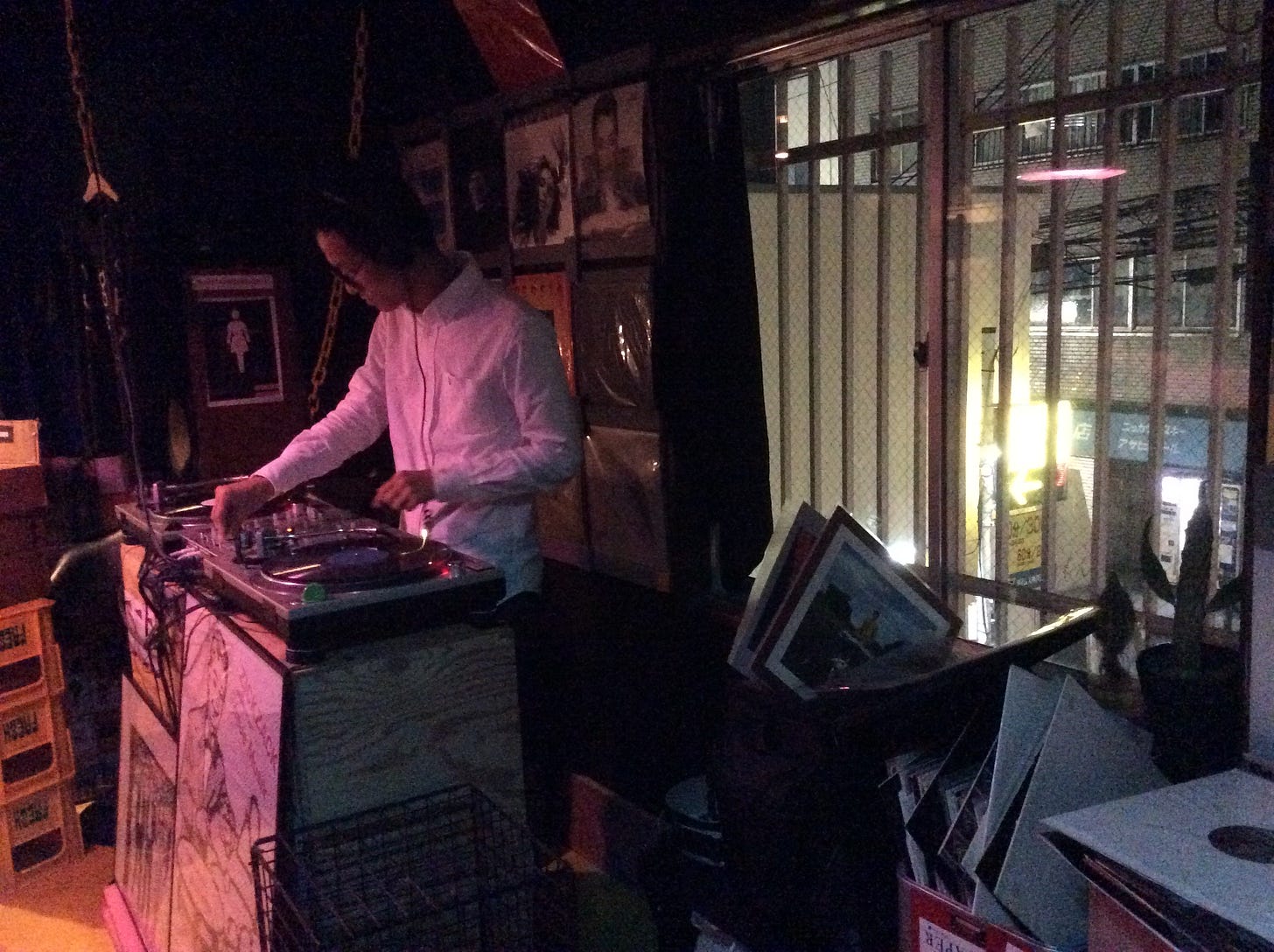Special edition: Record Store Day in China
China hasn’t been left out of the global vinyl revival of recent years, though inevitably it’s taken its own path
Hello and welcome to Concrete Avalanche, a Substack about music from China. Thank you for reading.
This is a special edition. Apologies for invading your inbox more frequently than usual, but with Record Store Day coming up this weekend, I wanted to take a quick look at record shops and vinyl in China.
🎵 The usual round-up of new music can be found here in case you missed it, and that format will return in the next issue. You can also find little updates from me in the meantime via Substack’s new Notes platform if you’re interested.
🫂 If you want to help feed my Bandcamp addiction you can do so here. You can also support me without spending a penny by sharing this newsletter.
🥁 And don’t forget that you can listen to lots of great music for free right here with Concrete Avalanche’s playlists.
Right, on with the actual post…
RSD in the PRC
April 22nd is Record Store Day, “a day for the people who make up the world of the record store—the staff, the customers, and the artists—to come together and celebrate the special role these independently owned stores play in their communities,” as the official RSD blurb has it. Also known as a day for queuing up outside Rough Trade in the hopes of getting your hands on that limited edition reissue or special RSD 7”. (It also happens to be Earth Day the same day, so if you are going record shopping it’s worth considering the impact of your purchases on the environment.)
China hasn’t been left out of the global vinyl revival of recent years, though inevitably it’s taken its own path.
In 1998, the closure in Shanghai of the country’s last remaining large-scale record-making facility seemed to mark the end of vinyl production in China. Instead, the country’s main relationship with the format appeared to be as the destination for the world’s unwanted records, with containers of ‘waste’ vinyl shipped from places such as Japan to southern China for recycling, in a similar manner to the CDs that gave rise to the dakou phenomenon. Rumour has it enterprising DJs and record collectors back then were able to slip owners of the recycling facilities a little money in return for letting them sift through the ‘rubbish’.
The opening of a new vinyl production facility in Guangzhou by Yongtong Audio in 2015 signalled the format’s return to the mainstream. But by that time, a revival in interest in producing vinyl records was already well under way in the country.
Nevin Domer and Genjing Records helped kickstart the trend, putting out a series of DIY vinyl-only releases for Chinese bands beginning in 2010. Since then, vinyl releases have become par for the course for most alternative acts, with labels such as Maybe Mars and Ruby Eyes regularly issuing 12” versions of their latest albums and Modern Sky digging into its extensive back catalogue (the label turned 25 years old recently) for a slew of reissues. In 2017, Modern Sky alone released 100 albums on vinyl.
There’ve been all sorts of colourful releases along the way, as well as experiments with format — Hak Hak Manufacture opened a lathe-cut facility in Guangdong around five years ago, one of Beijing’s best record stores / labels SpaceFruity recently put out a flexi-disc-inspired1 release, and late last month metal label Dying Art Productions unveiled a ‘buzz-saw’ red vinyl LP.
While there hasn’t been anything quite on the scale of Wilco’s Yankee Hotel Foxtrot or Taylor Swift’s Midnights, things have definitely gotten more expensive and there have been some overly elaborate vinyl releases. Still, the format’s popularity seemingly continues to rise in China.
By 2021, China’s vinyl record market was worth 276.81 million RMB ($40.19 million), an increase of 140% on the previous year, according to data from market research firm QYR. The same report put record sales at around 750,000 in 2021, though more recent data is hard to come by and this is likely based solely on new purchases through official channels. Those numbers followed a 359% year-on-year increase in income from vinyl sales in China between 2019 and 2020, according to data from the International Federation of the Phonographic Industry cited by Sohu.
Restrictions on media in the country mean that getting a license to sell music can be onerous and expensive, and even if you do secure one, there will be limitations on the artists and albums you can stock (it’s telling that the QYR report highlights classical music as a major driver of the rise in vinyl sales). Nevertheless, independent record shops are now present in many of China’s major cities.
And while the pandemic has impacted all areas of bricks-and-mortar retail in China, new record stores continue to be opened. One such space is a Suzhou outpost for Daily Vinyl, initially an online record store, events and vinyl education platform founded in 2014 by Cookie Zhang (now head honcho at Eating Music) and Endy Chen.
The new store, which in addition to records features shelves stacked with books and a carefully curated selection of wines, is located close to Soochow University. “People in Suzhou are quite familiar with vinyl,” says Chen. “This is not unrelated to Suzhou’s good cultural atmosphere, and it is also due to the hard work of record stores such as Gorilla Vinyl over the years. [The clientele] is mostly young people in their twenties, lots of students. Most young people’s music literacy has improved a lot compared to before, thanks to the popularity of streaming apps.”
Chen was not long out of his student days himself when he first got into vinyl in 2010. “I’d been buying CDs, but then I found that there was some music that was only available on vinyl, or that had a vinyl version but no CD, so I started buying vinyl records,” he says. “The first vinyl record I bought was at the Shanghai Shijiu Market, Thelma Houston’s Any Way You Like It. I’d been wanting to listen to it forever, but couldn’t find it on CD. So I bought the vinyl.” Today, his record collection stretches into the thousands.
Together with Zhang, and supported by Shanghai’s Uptown Records, Chen built Daily Vinyl as a platform that not only sold records, but sought to educate others about their value. They posted regular WeChat messages and produced a free newspaper focused on the format, while also holding events that encouraged newcomers to touch the records and play with turntables, not treat them as museum artifacts.
So how does he feel about the record buying environment in China today? “I think the situation right now is pretty good. The gaps in the market are being filled and there are definitely more cultural stores opening, which can’t hurt. There are a lot more record shops and the quality is becoming more standardised. The challenge is, of course, that the competition will be fiercer than in the past — in the past there wasn’t really any competition.”
The increase in the number of vinyl dealers in China means that Record Store Day is a reasonably big deal in alternative music circles in the country. Starting in 2012, some of the biggest and best fairs used to take place in the Uptown Records basement in Shanghai, courtesy of owners Sacco and Sophia’s network of vinyl sellers and their own carefully amassed collection of interesting records. Unfortunately, that space is no more (go find them in Tokyo instead), but here’s a sense of what it was like, courtesy of an old video from The Vinyl Guide:
Celebrations marking Record Store Day in Shanghai this year include an all-vinyl night at cutting-edge club ALL and a release party from Eating Music for the 12” version of vii M’s Sublunary, which will be held at new record shop jodo Space.
These will join RSD events taking place across the country, from a series of special vinyl exhibitions at Soundlibrary in the southeastern city of Dongguan, to a DJ workshop and vinyl party at Agan Village 404 in Dali, Yunnan, to two separate record markets in Wuhan, including one at long-running livehouse VOX. Beijing-based bié Records, a label who’ve been mentioned a fair bit in Concrete Avalanche previously, are also offering discounts on their vinyl back catalogue for the day through their online Weidian shop.
One of the biggest Record Store Day events in China will take place in Chengdu, where locally-based label and promoter New Noise has been marking the day since 2016. They’re bringing together independent vinyl labels from all over the country in a pleasant courtyard space downstairs from their offices and record store, which is also just down the road from Mintone Records’ own vinyl hang out. The event is a real celebration of the Sichuanese city’s vibrant vinyl culture.
A key participant in Chengdu will be Streaming Records, one of the city’s largest vinyl-focused shops. Located in part of an old shoe factory, the inviting, comfortable space is run by two friends, Lao Chen and Lao Mai. Originally arriving in Chengdu as students, the pair bonded over a shared interest in rock music, and after graduation they decided to remain in Sichuan’s capital, opening the first Streaming Records spot in an apartment block in 2017.
“Business wasn’t that great in the beginning,” says Lao Chen. “At that time, there were very few record stores in Chengdu and only a relatively small number of people would listen to vinyl records. But most people [who came to the shop] would find it really interesting — they often couldn’t believe that there were still vinyl records around in this day and age.”
By 2019, Streaming Records had built up enough business to open up a more formal space, incorporating a little bar and cafe and hosting occasional small-scale live performances. Then came Covid. “The three years of the pandemic have almost brought our operating conditions back to the beginning,” says Lao Chen. “The impact in the first couple of years wasn’t too big, but then in 2022 our income shrank significantly; people didn’t have the same spending power and we weren’t able to hold many events.” He adds that Streaming Records is “still in a recovery period.”
Events like Record Store Day will hopefully help with this recovery, though Lao Chen notes that Chengdu’s status as “a culturally inclusive city” is also a boost, with most of their young clientele people “who know music well and are willing to communicate and share [their passion]”.
And even against the backdrop of the pandemic, Lao Chen says there’s been “an obvious increase in the number of record stores in recent years as well as cafes and bars adding vinyl record areas.” He notes however, that “record buying is still a minority activity in China” and despite the growth of the last few years it’s clear that the future remains uncertain — both for China’s vinyl market in general or for Chen’s shop.
“I just hope Streaming Records can continue to survive,” he says, “even if we’re not making a lot of money. And I hope record stores don’t die.”
Alright that’s it for this issue. Hope you enjoyed the slightly different format.
P.S. If you can’t get to Chengdu or another Record Store Day event in China, consider clicking on any of the links to the new music included in every issue of Concrete Avalanche. I try to always include Bandcamp links because it seems to be the best platform for supporting artists and independent labels for the moment. You don’t have to buy vinyl records, but if you’re able to, please consider supporting those doing their best to grow an interesting scene in the country by paying for a download.
Not actually a flexi-disc as it turns out. See the comments.
















Love to learn more about a new aspect of China!
Hey Jake, late reply sorry. Got to 4 stores in Guangzhou for record store day. Pics and info if you want it! Lee.